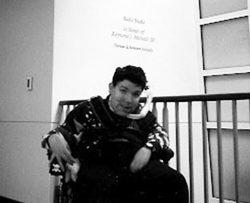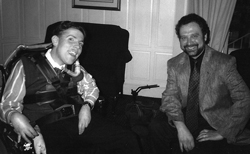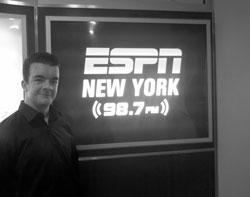Beloved Member of the Communication Department Passes Away
 Ray Michelli was someone you just couldn’t miss when you walked into a room packed with people. It had nothing to do with the fact that he was bound to a wheelchair; it had everything to do with an infectious smile, as described by many, which lit up everyone around him.
Ray Michelli was someone you just couldn’t miss when you walked into a room packed with people. It had nothing to do with the fact that he was bound to a wheelchair; it had everything to do with an infectious smile, as described by many, which lit up everyone around him.
After living with Duchenne Muscular Dystrophy for all his 36 years, Ray passed away on Thursday, October 6. Remembered by a support system of family and friends, he was also cherished by several members of the University community. As a communication student, a sports talk show host and DJ for WMCX, and a statistician for the University football team, this former Hawk had his plate full, but enjoyed every bite of it.
“As anyone who knew him came to realize, he was one of the proudest and most courageous human beings anyone could ever meet,” Nick Mischelli, Ray’s uncle, said during the funeral’s eulogy.
Dr. Chad Dell, Chair of the Department of Communication, commemorates Ray’s smile and positive attitude. “He was so passionate about radio, he was passionate about sports, and he always had something funny or an interesting angle that made me see things a different way, so I always liked talking to him,” Dell says. He heard of Ray’s passing on the University’s alumni Facebook page.
One University member who was particularly close with Ray was Professor Chris Cavallaro, who had him in his Introduction to Radio Production course and Advanced Radio Production courses in the late 90’s. “At first it was a professor-student relationship, but then I think we got to be more like friends.”
Cavallaro explains that in their first class together, Ray had already lost the use of his hands; a nurse accompanied him in every class meeting. “We struck a deal in the Intro class that since he couldn’t do the hands on work, I would trust him to work in the edit suite with his nurse, so long as he told the nurse how to do it.”
The class went to the next level, and there was the introduction of digital technology. An assignment in the Advanced Radio Production course was a storytelling piece, where students put together an audio of a personal story to share with the class. Cavallaro decided that since the audio piece was going to be so long, the format Ray did his projects in the past was not going to work.
In a class where all of the students proposed their storytelling ideas, Cavallaro remembers Ray not saying a word.
“I sensed something, you know, perhaps a reluctance there. So, I proposed that I would work with him on his story and that it be about him. I thought, ‘What’s his deal? Why are you in this wheelchair?’ He was so popular around campus, that I thought people would want to know.”
 Ray voiced the narrative, while Cavallaro edited it with the digital software. They discussed other elements that could be in the story, and it was titled “In the Eyes of Ray.”
Ray voiced the narrative, while Cavallaro edited it with the digital software. They discussed other elements that could be in the story, and it was titled “In the Eyes of Ray.”
Cavallaro says the two did come across some creative differences. “I’m supposed to be this big expert, you know?” he laughs, “but he had his own take on things. He had his way that he wanted the story to unfold. And his decisions turned out to be good ones.”
That same storytelling piece was entered into the National Broadcasting Society and Ray ended up as a finalist in the competition.
Journalism Professor John Morano was also close with Ray. He had him as a student and also served as one of his academic advisors. “People often underestimate how much faculty learn from their students, and sometimes you learn about your subject area from them. Other times you learn about life,” Morano says. “I think about Ray often, long before he left us. He had a perpetual smile, he climbed over more hurdles than anyone I know, and for the rest of my life, he will inspire me.”
With family, Cavallaro and Dell both said Ray had strong relationships. His mother Roseann, according to Nick, “spent much of her life caring for Ray- 24 hours a day to the point that she never trusted caregivers to work without her supervision”, his father Thomas is a University Trustee who “worked hard to assure that his family had what it needed to make Ray comfortable”, his brother Richard, sister-in-law Angela, and two nephews, Matthew and Christopher.
“Ray was surrounded by his loving parents and brother and his brother’s family and his friends every day and by his cousins and other family members whenever possible. He was always in our hearts, and will always be there,” Nick read during the eulogy.
With a passion for athletics, not even a disease like muscular dystrophy could keep Ray off Kessler Field. According to a 2007 article in the Star Ledger, he chose to attend the University over his parents’ choice, Brookdale Community College, because it had just started a football team in 1992.
Head Coach of the football team Kevin Callahan says Ray will certainly be missed at University athletic events. “From the first time I met Ray it was obvious he had a passion for athletics and a love for Monmouth University. In the early years of Monmouth football, Ray was a constant fixture on the sideline charting tendencies for our defense. I am happy that we were able to provide Ray with an opportunity to contribute to the football program as he was a valuable asset to us on game day. Ray was a terrific young man and an inspiration to all of us.”
Morano reminisces about a time he saw Ray at a Monmouth football game. “This is from a former linebacker speaking, and Ray was on the sideline doing stats and I knew how much he wished he could have a helmet on and some pads. And I knew in his heart he was making every tackle, and catching ever pass. And while I thought about that, I realized something that normally wouldn’t have occurred to me, but without a doubt, the toughest guy in that stadium was not a 300 pound tackle, but a guy on the sideline, in a wheelchair, named Ray Mischelli.”
Ray was a frequent guest at the Communication Awards every April, and had only stopped attending a few years ago. Even with a daily struggle such as muscular dystrophy, both Dell and Cavallaro say that Ray continued to work through his disease to fulfill his education and live his life fully.
“Just the guts to come every day, I think it took a lot of determination,” Cavallaro says. “He loved the University, he loved the people here, he obviously loved learning and he wanted to be out in the world and he was willing to put up with whatever it took to do that.”
According to Cavallaro, Ray also had a good sense of humor. “His mom told me at the wake that he was in high spirits the day he died, so it wasn’t a front. You know what I’m saying? Sometimes I thought maybe it was a way to put people at ease, or even keep people away. But no, that’s just the way he was, he was just a really upbeat guy. The most upbeat person, maybe that I’ve ever met.”
His work with WMCX did not go unnoticed, according to Broadcast Technical Assistant Eric Reisher. While Reisher was also going for his undergrad, before joining WMCX, he would listen to the radio and often tune in to Ray’s shifts. “I would always hear his voice on the air and never put the two and two together that this guy was Ray.”
As the years passed, Reisher became WMCX’s Program Director. After trying to find a student to work on a show with Ray, Reisher says “I didn’t trust anyone, so I did it.” Reisher enjoyed his time with Ray, from discussing music and different bands, to sports, even though the latter wasn’t Reisher’s strongest point. “I always made sure to brush up on my Jet’s stuff so we would be able to talk about them once fall came around,” he softly laughs.
Nevertheless, Reisher says the former student had a good ear for music, and “could tell you anything about any band.” Among his favorite artists, according to Reisher, were Semisonic, Dynamite Hack, SR-71 and Blink-182.
Even after he officially flew from the Hawk’s nest in 2000 with an undergraduate degree in communication, Mischelli still came to WMCX to do air shifts for a few years after graduation. Rett Rich, former professor and advisor for WMCX, said the station always made the studio available to Ray when he felt up to coming in. “He also did a DJ show, and after a while we had Eric engineer it for him and Ray would come in and comment on mic between songs. He loved the radio station,” Rich said.
Cavallaro agrees. “He was one of the most dedicated WMCX staffers,” he chuckles. “You know, this guy had to be brought here in a special van, and sometimes the elevator in the Student Center wasn’t working. Other people would just blow through their air shifts, but he went through a lot to make sure he showed up.”
In 2002, the Jules L. Plangere Center was built, and WMCX moved from its former home in the Student Center. Ray’s parents made a donation to the communication-based building, and the radio station’s space is named in their son’s honor.
“It honored his life. It didn’t recognize his disabilities, it didn’t hint as his death. It was always about his life and what he brought,” Dell says about the sign.
Other than his participation at Monmouth, Ray was also the NJ Goodwill Ambassador for the Muscular Dystrophy Association, a parishioner of St. Anselm Roman Catholic Church and a member of the National Broadcasting Society. He also served as manager of the Ocean Township Football Team.
Dell suggests Ray was a role model for students. “He delivered regardless of the barriers that were in front of him. And he always did really good work. He was a role model that said ‘Look what I have to overcome, and it’s not a problem’. I learned that Ray was an object lesson on how to live life fully.”
In light of Ray’s passing, The Raymond Mischelli Scholarship Fund has been established, and donations can be made to University Advancement.
“Ray was an amazing young man, who had a passion for music, athletics and making people smile. Monmouth University gave Ray the challenges, support and the friendship he needed to feel like a normal student. His years at Monmouth were the best part of his life and we are very grateful to everyone that contributed to his great experience during those years. We know he will be remembered at Monmouth and the Monmouth family will always be part of our family’s life,” Tom Mischelli says.
In his eulogy, Nick Mischelli stated Ray’s disability didn’t stop him from reaching his dreams. “His perseverance and optimism are why he was a hero to me and to so many others. Whenever times get a little tough I find myself thinking of Ray and his courage, and I can’t give up. He didn’t. And neither should you.”
Cavallaro said at the funeral, the storytelling piece Ray and him had collaboratively worked on many years ago started playing. “When I heard that, it just made me think, ‘wow…’.”
In the audio piece, after Ray tells his story, his voice ends and the song “Black Gold” by Soul Asylum comes on, with a significant lyric Cavallaro brought forth.
I don’t care about no wheelchair. I’ve got too much left to do with my life.
PHOTO COURTESY of Tom Michelli
PHOTO COURTESY of Chris Cavallaro



